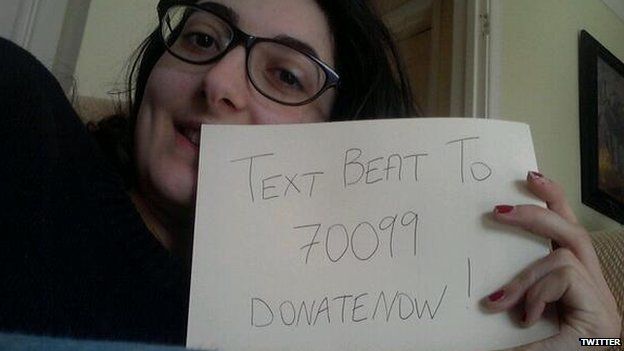Why the 'no make-up selfies' campaign raised £2m
- Published

The selfie has reached a new zenith this week, thanks to the No Make-Up Selfie for Cancer Awareness campaign which has seen £2m raised for Cancer Research UK in the space of just a few days. But how did it happen?
The #nomakeupselfie started trending on Tuesday as women posted pictures of themselves without make-up on Twitter and Facebook, and urged their friends to do the same.
Cancer awareness became the theme, selfie posters pledged donations to cancer charities and CRUK set up a text number to make donating even easier.
But the cancer charity did not kick-start the trend - it grew organically, making a huge impact on social media and getting attention in national newspapers and on radio and TV news.
So why did it go viral? Was it all about raising awareness and money for life-saving research?
No-one quite knows how the trend started. It may have been related to the Oscars selfie featuring a gaggle of gorgeous A-list actors which was retweeted endlessly following the film awards in early March.
Or it may have been a reaction to the negative comments directed towards 81-year-old actress Kim Novak following the same event.
People lined up to sympathise with her by posting pictures of themselves in (mostly) unflattering lights.
With hundreds of thousands of donations, 826,000 likes on Facebook and 140,000 followers on Twitter, Cancer Research UK confessed to being "overwhelmed with donations and support".
But not everyone is behind the idea that women revealing their real face is something brave or altruistic.
Commentators have lined up to say that the campaign made cancer awareness all about vanity and emotion rather than about useful, practical action.
Dr Linda Gibson, senior lecturer in public health at Nottingham Trent University, says the success of the campaign shows that social media is a very powerful medium, particularly among young people, but there are dangers inherent in it too.
"This campaign has captured the imagination. Very rapid communication like this has never been faster in human history, but you have to be careful.
"You can lose the depth of message. When thinking of designing interventions using these media there can be unintended consequences."
The message may not be clear, but that can be a good thing because it forces people to ask "what's this about?", she says.
The problem comes when people believe they are doing something important when really their actions are not changing anything.
In that case, aren't we just using social media to clear our consciences, just by sending a selfie?
The money raised - 80p in every £1 donated goes to cancer research - suggests this is more than just an exercise in self promotion.
Images sent to CRUK demonstrate that people want to show their solidarity with cancer sufferers, and pay tribute to friends and family who have died from the disease.
The Institute of Fundraising says combining popular trends with fund-raising is a great way to reach young and untapped audiences. Men are now getting on board by posting selfies of themselves wearing make-up, this time in a bid to raise awareness of men's cancers.
Use of celebrity trends also helps to target those that wouldn't necessarily think about the charity or the cause otherwise, it adds. And there have been plenty of big names posting their selfies this week.
But perhaps there is more to the success of this selfie campaign.
"Maybe it's about how women feel about themselves, and their private and public faces," says Dr Gibson.
"The image of women in the media can be so artificial and constructed that body image often becomes an issue.
"This is almost an act of rebellion."
- Published21 March 2014
- Published20 March 2014
- Published20 March 2014
- Published25 January 2014